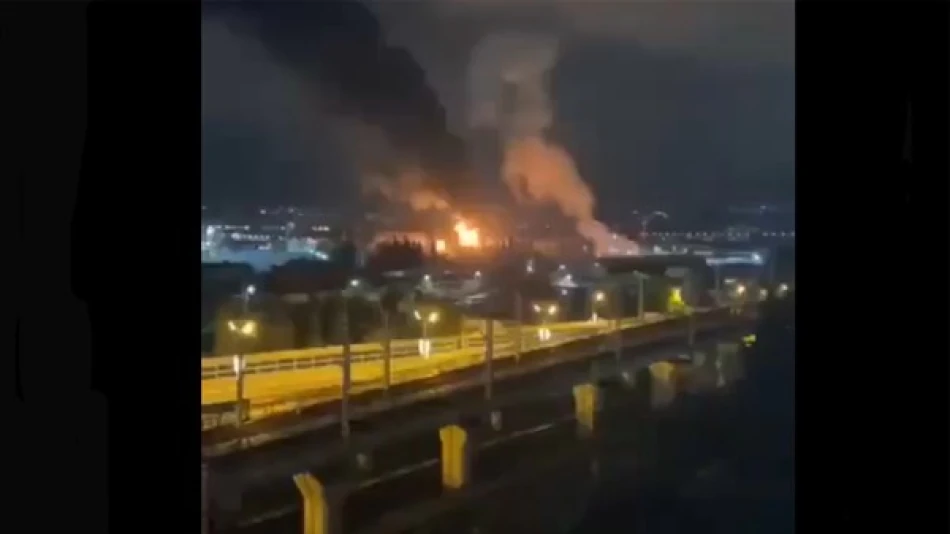
Massive Oil Depot Blaze Erupts in Russia after Airstrike
Ukraine Extends Drone Campaign Deep Into Russian Territory with Sochi Oil Facility Strike
A drone attack ignited a major fire at an oil storage facility in Sochi, Russia's premier Black Sea resort city, marking another escalation in Ukraine's long-range strike capabilities against Russian energy infrastructure. The incident, which temporarily disrupted air traffic at Sochi's international airport, demonstrates how the conflict is increasingly reaching into Russia's economic heartland, some 400 kilometers from the Ukrainian border.
Strategic Targeting of Energy Infrastructure Intensifies
Local authorities confirmed that drone debris struck an oil tank in Sochi overnight, triggering a significant blaze that sent black smoke billowing across the coastal city. Veniamin Kondratyev, governor of the Krasnodar region, announced the attack via Telegram, while Sochi Mayor Andrei Proshunin assured residents that no casualties were reported and firefighting operations were ongoing.
The strike represents a continuation of Ukraine's systematic campaign against Russian energy facilities, which has proven increasingly effective at disrupting fuel supplies and creating economic pressure. Unlike earlier phases of the conflict where such attacks were rare, drone strikes on Russian oil infrastructure have become a regular occurrence throughout 2024.
Sochi: From Olympic Venue to Strategic Target
The choice of Sochi as a target carries particular symbolic weight. The city, which hosted the 2014 Winter Olympics and serves as a favored vacation destination for Russia's elite, has largely remained insulated from the war's direct effects. The attack signals Ukraine's ability to project force into areas previously considered safe havens.
Economic and Psychological Impact
Beyond the immediate infrastructure damage, strikes on civilian areas like Sochi serve multiple strategic purposes. They demonstrate to Russian citizens that the conflict's costs extend far beyond the battlefield, potentially eroding domestic support for the war. The temporary suspension of flights at Sochi International Airport, even briefly, disrupts normal economic activity and tourism revenue.
Evolving Drone Warfare Capabilities
The 400-kilometer distance from the Ukrainian border to Sochi underscores the impressive range and sophistication of Ukraine's drone program. This capability mirrors similar long-range strike developments seen in other modern conflicts, where relatively inexpensive unmanned systems can deliver strategic effects against high-value targets.
Ukrainian forces have increasingly focused on oil refineries, storage facilities, and fuel depots across western Russia, recognizing that energy infrastructure represents both an economic vulnerability and a military necessity for Russian operations. These attacks complement broader Western sanctions aimed at constraining Russia's energy revenues.
Regional Security Implications
The Sochi attack highlights the expanding geographic scope of the conflict's direct effects. The Krasnodar region, despite its distance from active fighting, has become increasingly militarized as Russia uses it as a logistics hub and staging area for operations in occupied Ukrainian territories.
For regional stability, these deep-strike capabilities represent a significant shift in the conflict's dynamics. Russia's ability to conduct military operations from areas it considered secure is now compromised, forcing a redistribution of air defense resources and potentially impacting operational planning.
The incident also raises questions about the effectiveness of Russian air defense systems in protecting critical infrastructure across the country's vast territory. As Ukraine's drone technology continues to evolve, more Russian cities and facilities previously beyond Ukrainian reach may find themselves within striking distance.
Most Viewed News

 Layla Al Mansoori
Layla Al Mansoori






